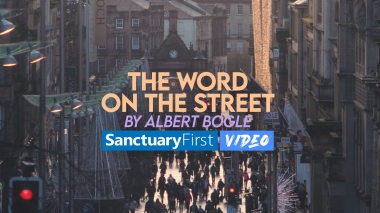We are one generation from extinction

Part 1
Ploughing and sowing can be a risky occupation. The seed is sown in the ground but, in a sense, has to die. In dying to its own shape and form it changes into a new creation, a new form. It becomes a stock of grain or a beautiful flower. Many congregations throughout the Church of Scotland are beginning to see that we cannot continue with 'business as usual'. Perhaps many of us will have to die in order that new life and growth can come about. Almost twenty years ago, Loren Mead of the Alban Institute challenged us to be radical:
“The storm buffeting the churches is very serious indeed. Much more serious than we have admitted to ourselves, and much more serious than our leaders have yet comprehended...The storm is so serious, I believe that it marks the end of ‘business as usual’ for the churches and marks the need for us to begin again building the church from the ground up.” (Transforming Congregations for the Future, p ix)
Looking for solutions
If the present model of church is broken and not working for an ever-growing number of people where will we find solutions? Thousands of Christians have stopped attending their parish churches, some have gone to other denominations, but the vast majority remain disconnected from formal church activities. Having the courage, strength and will to change the present model of church may be too difficult for those who pull the levers of power, be it at a local or national level. Perhaps the solution being offered through Fresh Expressions, (a movement influenced by the Church Without Walls Report (CWW)), to grow alternative church models alongside the old may be a partial answer for the need to nurture and disciple, non-church-attending Christians.
Sanctuary First is an example of a Fresh Expression which has emerged from a congregation, supported by a Presbytery and encouraged by the Ministries Council to explore the potential of a congregation based on the internet.
 Reluctant To Change
Reluctant To Change
The Church Without Walls Report of 2001 challenged the Church to have a changed mindset. Today a great deal of what was in that report remains unheeded although it continues to be admired and quoted often from sources within and outside the Church of Scotland. The Panel of Review and Reform, once again, at the 2016 General Assembly invited the whole Church to consider seriously the 2001 CWW Report and begin to practice its recommendations.
Do we have the capacity to bring about change?
The present initiative entitled “On the Road” initiated by the central councils of the Church is an attempt to try and listen to those who have left the church, and also re-introduce local congregations to much of the philosophy of Church Without Walls. Today’s congregations must egin to recognise that they are the shapers of the church of today and tomorrow. Local congregations will require to be much more proactive. Their own survival will depend on their missional heart. Inviting congregations in a locale to work together to develop a fresh expression of church should be one of our key missional objectives. However it may be too difficult for a national church to consider seriously the implications of being shaped from the edges rather than the centre. The Church Without Walls Report recommended the following fifteen years ago:
While challenging the existing structures, we have become aware of the hurt caused by the breakdown of trust between the Church locally and centrally. We have found that some of the greatest frustration with the current system of church is to be found among those who operate “at the centre”. There is a passion to serve the local church, but our mental models have created false expectations and often paralysis of action.
The current mental model assumes a top down pattern of governance – from centre to Presbytery to local congregation. We recommend that the shape of the church be turned upside down to affirm the primacy of the local Christian community, supported appropriately by Presbytery and central administration.
The question now facing many of our congregations is, do we have the heart and the energy to embark on a new way to model the church? One thing is for certain: we will require to find resources and personnel to draw alongside congregations and enable them to begin to think creatively and work collectively in strategic groupings. It will be important that after the Councils have completed their listening exercise around the country that it be followed-up with decisive action. Being able to identify the places where there is a willingness to bring about change will be an essential ingredient if resources are to be effective.
Keeping our focus
This is a crucial time in the life of the church and we certainly require fresh thinking, however we need to keep our focus on our calling, and never on our fears. Recently I was reminded of a quote from the famous Scottish divine Samuel Rutherford. He wrote at a time of great uncertainty and fear:
It is our Lord's wisdom, that His kirk should ever hang by a thread; and yet the thread breaketh not, being hanged upon Him who is the sure Nail in David's house (Isa. xxii. 23), upon whom all the vessels, great and small, do hang; and the Nail (God be thanked) neither crooketh nor can be broken.
It is surely this knowledge that God is working out his purposes that will sustain and strengthen us. We no doubt will continue to struggle and revise alternative church models. Some will succeed; others will flourish for a time. The church will continue regardless its shape. We are a people who are called to establish an alternative kingdom. One not built on human wisdom but out of the will of God. Our power and effectiveness does not depend on our structures and strategies and technologies but on our relationship with Jesus Christ our King and head.




 Add to Favourites
Add to Favourites







Login to comment.